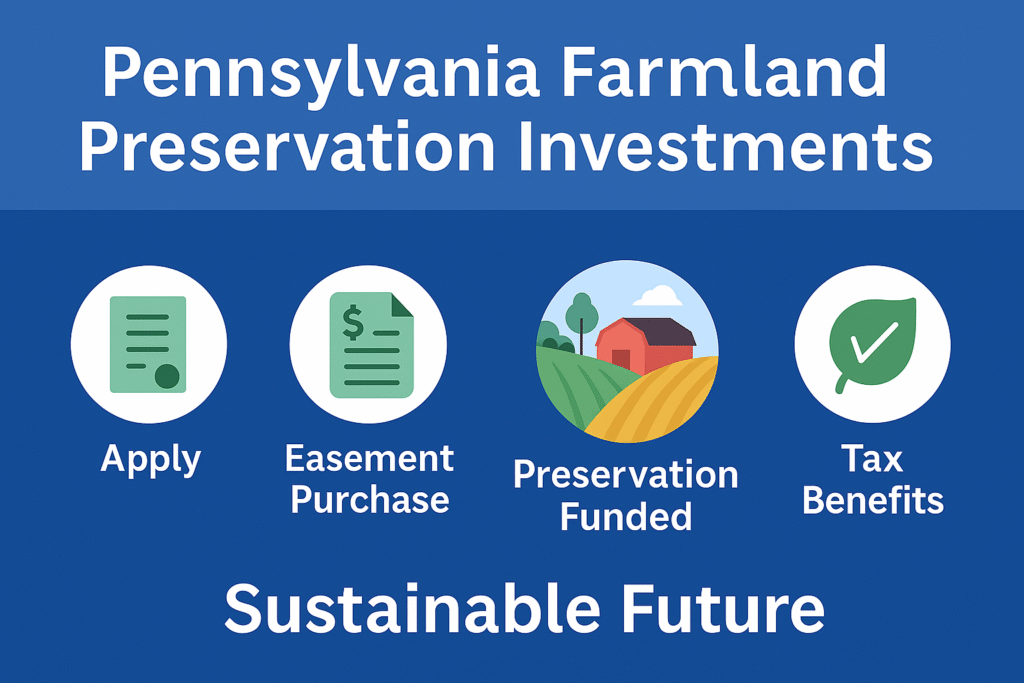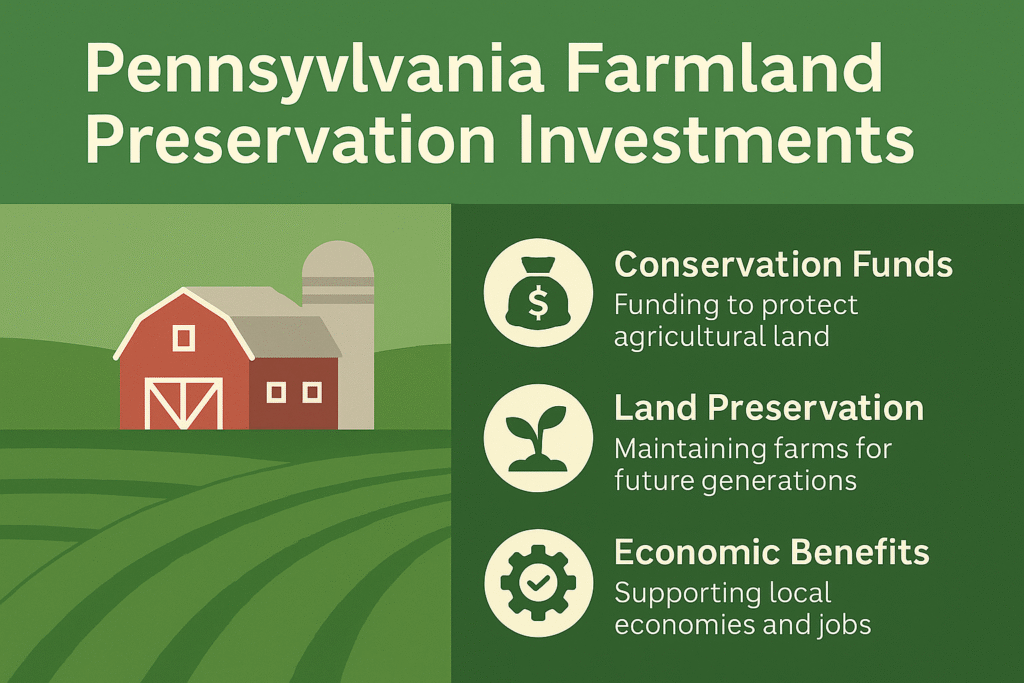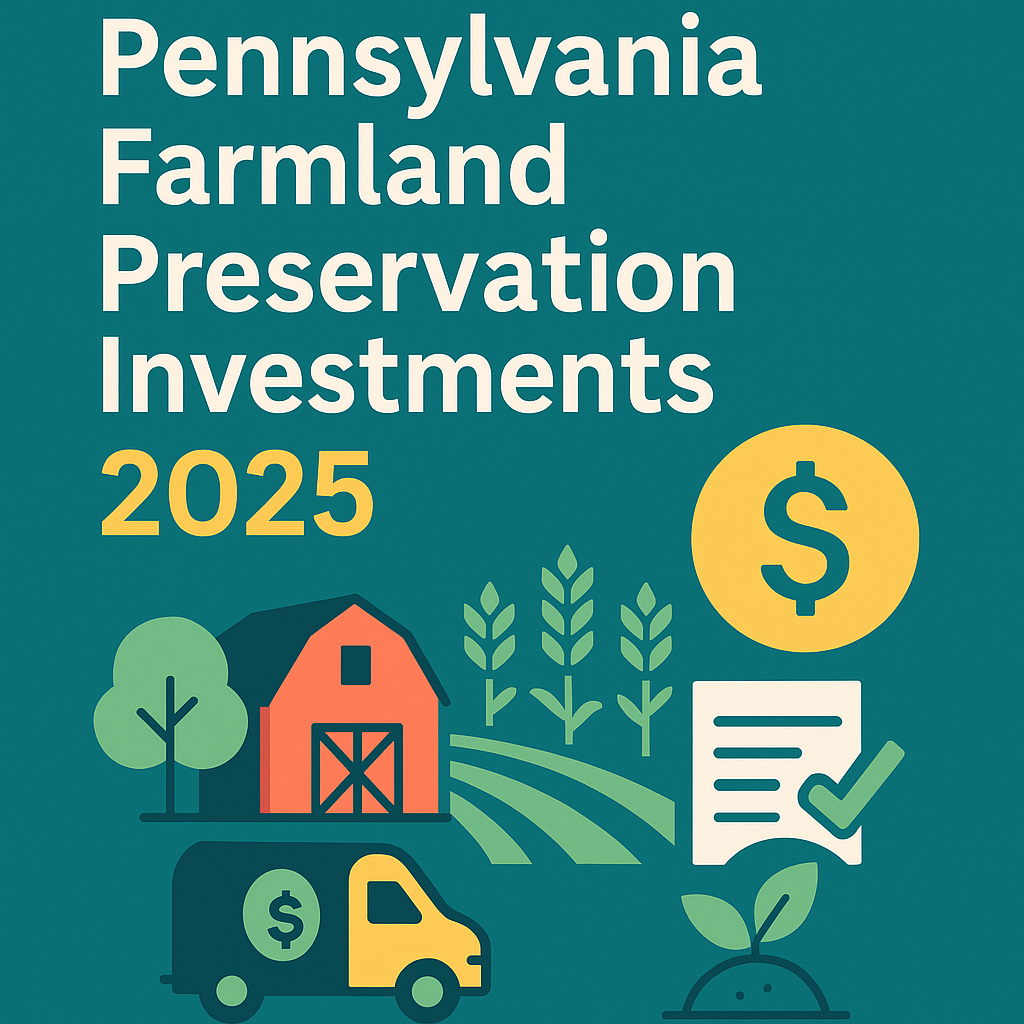Introduction to Pennsylvania farmland preservation investment
Pennsylvania farmland preservation investments are reshaping how the state protects working farms while attracting mission-driven capital. By channeling funds into conservation easements, farmland trusts, and county programs, investors help keep prime soils in production, limit sprawl, and strengthen local food systems. These investments don’t just safeguard acres—they also create stable, long-term value through tax incentives, ESG alignment, and resilient land use. In this guide, we’ll explain how the programs work, where the money flows, how to evaluate returns and community impact, and practical ways individuals, families, and organizations can participate.
Now, here’s where it gets interesting. Whether you’re a farmer, investor, policymaker, or just someone who cares about the future of our food system, farmland preservation isn’t just a feel-good cause. It’s a smart, long-term investment. You’re not just saving land—you’re supporting the local economy, keeping agriculture alive, and promoting environmental sustainability all at once.
👉 Related Read: Looking to compare other investment strategies? Check out our guide on the Dave Ramsey Investment Calculator.
What Is Farmland Preservation?
Farmland preservation is all about keeping farmland… well, farmland. It means protecting agricultural land from being turned into shopping centers, parking lots, or rows of houses.
In Pennsylvania, this happens through something called conservation easements. Sounds technical, but here’s the gist: the state pays landowners to give up the right to develop their land for anything other than farming. The land still belongs to them—they can farm it, lease it, or pass it down to family—but it’s legally protected from being paved over or built up.
It’s a win-win. Farmers get fair compensation, and the land stays green, open, and productive for generations to come.
According to the Pennsylvania Department of Agriculture, the state has preserved over 6,000 farms and 600,000 acres since the program began in 1988.
Why Farmland Preservation Matters in Pennsylvania
1. Protecting Food Security
Imagine a future where fresh, local food is hard to come by. Not ideal, right? By preserving farmland today, we’re making sure future generations can still enjoy locally grown fruits, veggies, dairy, and more—right from Pennsylvania soil.
2. Boosting the Local Economy
Imagine a future where fresh, local food is hard to come by. Not ideal, right? By preserving farmland today, we’re making sure future generations can still enjoy locally grown fruits, veggies, dairy, and more—right from Pennsylvania soil.
3. Conserving the Environment
Open farmland doesn’t just look nice—it plays a major role in keeping the environment healthy. It helps manage stormwater, supports clean air, and provides natural habitats for wildlife. Plus, it helps curb the spread of endless sprawl and overdevelopment.
4. Preserving Cultural Heritage
In many parts of Pennsylvania, farms have been in the same families for generations. They’re more than land—they’re legacy. By keeping these farms intact, we’re preserving a rich history of hard work, tradition, and community values that have shaped the state for centuries.

How Investing in Pennsylvania farmland preservation investment Works
You don’t need to own a tractor—or even a plot of land—to invest in preserving farmland. In fact, most farmland preservation investments don’t involve buying land at all. Instead, they focus on supporting programs that protect farmland through conservation easements or fund the infrastructure that keeps farms running strong.
1. Government Programs
Pennsylvania runs one of the top farmland preservation programs in the country. Through the Agricultural Conservation Easement Purchase Program, the state and local counties buy development rights from farmers. That means farmers keep farming, but the land stays protected—forever.
2. Private Investment Opportunities
If you’re a private investor or work with a foundation, you can team up with land trusts or nonprofit groups to help fund preservation projects. These partnerships help protect large tracts of farmland while delivering long-term community and environmental benefits.
3. Community Supported Agriculture (CSA)
Want a more hands-on approach? Investing in a CSA program is a great way to back small farms directly. In return for your support, you get regular deliveries of fresh, local produce. It’s a feel-good way to support local agriculture—and eat really well.
Who Funds Pennsylvania farmland preservation investment
State Government
Pennsylvania is a national leader when it comes to public investment in farmland preservation. The state has committed significant funding over the years, showing just how serious it is about protecting its agricultural roots.
Federal Programs
The USDA’s Agricultural Conservation Easement Program steps in with grants and technical support to help preserve farmland across the country, including right here in Pennsylvania. Learn more at USDA.gov.
Local Contributions
It’s not just the state and federal government pitching in. Many counties and municipalities also dedicate local tax dollars to preservation efforts, matching state funds to protect even more acres.
Benefits of Pennsylvania farmland preservation investment
Long-Term Land Protection
Once farmland is preserved, it stays farmland. Forever. That means your investment helps keep Pennsylvania’s agricultural landscape intact for future generations.
Attractive Tax Incentives
For landowners, donating or selling development rights can unlock major tax deductions. It’s a smart financial move that also supports a bigger cause.
Stronger Communities
Preserved farmland helps build resilient local food systems, supports small farms, and keeps rural economies thriving. When farms succeed, entire communities benefit.
Risks and Challenges of Pennsylvania farmland preservation investment
Lower Immediate Returns
If you’re looking for a fast financial payoff, this might not be the right fit. Farmland preservation is more about long-term sustainability than quick profits.
Legal Restrictions
Once a conservation easement is in place, that land is permanently restricted from being developed. That’s great for preservation—but it does limit future use and resale options.
Market Fluctuations
Just like any agricultural investment, shifts in the market—from crop prices to demand—can affect land value. It’s something investors should factor into the equation.

FAQs About Pennsylvania Farmland Preservation Investments
Q1: Can individuals invest in farmland preservation?
Absolutely. You don’t need to be a large corporation to get involved. Individuals can invest by partnering with land trusts, supporting community-based preservation funds, or even purchasing land and placing easements on it.
Q2: Pennsylvania farmland preservation investment profitable?
Not in the traditional sense. Farmland preservation isn’t about chasing quick returns. The value comes through long-term stability, potential tax benefits, and the impact you make on the land, community, and environment.
Q3: What kind of incentives are available?
There are several—state and federal tax deductions, conservation grants, and sometimes local matching funds that can help offset costs.
Q4: Is Pennsylvania really a leader in this space?
Yes, it is. With over 600,000 acres already preserved, Pennsylvania runs the most successful farmland preservation program in the country.
Q5: Can preserved farmland still be used for farming?
Definitely. Farmers keep full ownership and can continue to work the land. The only thing they give up is the right to develop it into housing or commercial properties.
Conclusion
Investing in Pennsylvania farmland preservation isn’t just about growing wealth—it’s about growing something that lasts. It’s a commitment to protecting the state’s rich agricultural heritage, supporting rural communities, and making sure future generations have access to fresh, local food.
Sure, it might not deliver the quick wins of other investments. But what it does offer—tax advantages, environmental impact, and meaningful social value—can be just as rewarding in the long run.
If you’re looking to align your investments with your values and make a real difference, farmland preservation is a path well worth exploring.


Leave a Reply